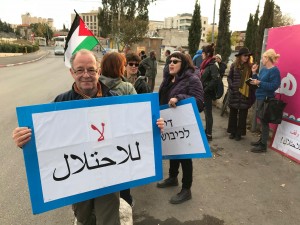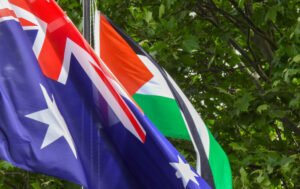
I was quite infuriated a few days ago to read an article “How Israeli rights groups prevent Palestinians from framing their own reality“ in Middle Eastern Eye by Haneen Maikey and Lana Tatour ( https://tinyurl.com/n45xar2v) which has been hailed as an important contribution to supporting Palestinian advocacy without outside domination, silencing, a ‘racial hierarchy’, implicit Jewish/Israeli supremacy and colonization (most of those words appear in the article) by Jews.
Thus it concludes “Our concern is less with how to make Israeli organisations and activists less racist or more accommodating of Palestinians. We are more concerned with how we, as Palestinian activists, human rights organisations and solidarity groups, should respond to this racial dynamic.
Our lived realities and knowledge should not be footnotes in the reports of white, Israeli, settler-colonial organisations. A way forward is to centre Palestinian knowledge and the liberationist anti-colonial agenda “
To be fair, the the article does address an important issue, and that is the danger of occupying Palestinian advocacy spaces.
However, what I think underlies the article is an essential rejection that Israelis/Jews also have a role to play–a different one, to Palestinians in opposing the occupation and other aspects of Israeli politics. It is also angry about the limitations that Jewish/Israeli organisations have in their politics, given their fraught standing. The article particularly focussed on B’tselem and why organisations like it, which rely on Palestinian field workers, keep them in second place, colonizing and manipulating Palestinian voices for their own purposes.The article also I think reflects a frustration–and the difference–between Palestinians within Israel who can work in the system and those in the diaspora or under occupation (as the two authors are), who feel that the only way forward is separately.
It is of course, their right to call for a separate path for advocacy, but personally, I think that is deeply flawed. Thus B’teselem and other organisations are typified as part of the Zionist enterprise, as merely “settler colonialist organisations” who “footnote” Palestinians. That’s a pretty extraordinary statement to make about organisations that oppose the Israeli government, organisations that receive all sorts of threats and so on.
I offered a critique of the article on a local (Jewish) academic and activist’s FB page to which I only received a series of rude insults about my lack of intelligence, defensiveness, and inabilty to accept critical analysis. The refusal to even engage in an argument says a lot about some of the divisions on the question of Palestine even in Australia. Debate is shut down. I think it is also reflective of the failure of what’s become known as solidarity politics – that you don’t criticize those you support, because they are the victims of oppression (but here, one of the authors of the article is an academic in Sydney). Another interpretation that I am considered as not able to voice an opinion on the matter because I am not part of that oppressed group (only people who fully identify with that group in a certain political way are entitled to speak).
Whatever the reason for the failure to engage, rather than fair critical analysis, I thought the article engaged in a bit of (for want of a better term , and its a bad one), abstruse race essentialism about Ashkenazi Jews coming out of “whiteness” and subaltern studies, and a desire to prove that there was a kind of apartheid operating in these organizations (they called it a glass ceiling). They are also angry that Mizrahi Jews are excluded from such organisations (here, being essentialists, they completely ignore the actual general political orientation of Mizrahi Jews). The article also gave no credit to the constrained circumstances under which many Israeli NGOs work, but all the previous reasons explain why they are unacceptable to the Palestinian cause.
None of my own analysis about the empirical sloppiness of the article in terms of the organisations they criticize was addressed in the riposte.
Here is what I put in a comment to the FB post, with a few tiny changes
==============================
[In the article] they accuse NGOs of an “Ashkenazi Jewish-Israeli supremacy problem.”
Check the reality, the funding dependency. NGOS in Israel are under threat & there is a line they cannot cross in change and advocacy work, both with many liberal foreign donors and particularly with the Israeli government. They are primarily speaking to Jews and Israelis and other governments or the UN about the evils of their regime over another population /land. That comes at a political price. They cannot, and should not become Palestinian advocacy organizations. They are primarily in dialogue with American Jews. This is where the power to change the situation lies, much as Palestinians may wish for a totally independent path. They have to be pragmatic, whatever they may think should be done. Israel is not a democracy of the first order. It is a militarised state with certain restricted democratic activity. We all know that. If you’d prefer the NGOs to be closed down, so be it.
But the authors are right about the apparent lateness of organisations like Betselem to use the word apartheid. It’s been a struggle, and the price is high (given the internal Israeli & foreign situation, that the authors give no acknowledgement of). Isn’t that change in the organizations to be applauded?
There thus appears to be a contradiction in the logic of this article. On the one hand, NGOs are presented as colonisers of opposition to a conflict, of silencing Palestinian voices. Of being “supremacist”. But on the other hand there is a demand they support Palestinian NGOs – but given that some of these NGOs are non-acceptable because they work within some (Zionist or funding) limits, that ‘help’/advocacy would be rejected anyway. The writers should know that there is extraordinary suspicion of outside offers of assistance and resistance to ‘normalisation’ [with Israelis] – I’ve been through this experience. If you wish to remain separate, and won’t accept others for who they are, you pay the price.
Now, as for employment practices and the ‘racial hierarchy’. Race? A terrible word, frankly, whatever abstruse modern takes are put a upon it. The issue is political.
I think the argument is confused. I think there issues around employing Palestinians across the Green Line though I know of organisations which employ staff there. Palestinian staff from the West Bank unless Israeli have all sorts of travel and security restrictions. As an example, there was a Taayush activity I went on. The Palestinian organizer was legally unable to enter one of the areas we went into – or the army would have dealt with him quickly.
The authors also are not aware of people like Ezra Nawi in Taayush who just passed away, or other people from Arab lands who take an academic role, and prefer not be engaged in direct politics, or live outside the country ( Ella Shohat, Eva Illouz), or just refuse to be engaged. Other Mizrahi activists have a much domestic & narrower focus in a community (which is diverse) that is generally hostile to Palestinians.
And perhaps, leading potential Palestinian candidates for positions have taken on roles internal to Israel politics (Joint List), or rightly put their efforts into autonomous Israeli Palestinian organizations. In fact, we can see signs of this upward trend, in both the medical field and academia- a whole new generation of Palestinians in authority. But to take on state oppression, in a senior leadership role, is well…
Thus the pool of engaged people of both Palestinian & Jewish backgrounds to draw on is not large, the personal and political cost enormous in Israeli terms. And what’s the jibe at Israeli Americans? Would they say that about Jeff Halper? Or Gershom Gorenberg? [Both these people are of US Ashkenazi origin, strong advocates of Palestinian rights]. The jibe at Ashkenazim is thus quite unfair. And given the political orientation of most Jews from Arab lands, their critique is offside. People from the latter communities are not inclined to oppositional politics in Israel. NGOS can’t be blamed for that.
The Ashkenazi criticism is thus opportunistic and not well researched (and off course, stereotyping), and well, a wee bit racist.
I looked at Betselem’s website – 3 of the board are Israeli Palestinian, one is the Iranian Israeli Orly Noy who identifies as Mizrahi. About 50% of the staff are Palestinian. The two research directors appear to be Israeli Jews. The Director El-Ad also served in the army, but that is what you’d expect in such an organization. Unless there were a Palestinian Christian, or other ‘minority’ such as a Druze who had served in the army, there will only be Israelis in such a role. Half of Gisha’s board are Palestinian, about 1/4 of staff Palestinian. The director of Hamoked is a British Jewish woman, who appears to have Sephardic ancestry. 1/2 the staff are Palestinian. Three board members are Palestinian. As for Physicians for Human Rights, the board chair is a Palestinian woman doctor.
What the writers appear [also] upset with is that the media /writing is staffed by fluent English speakers or writers and written reports don’t have Palestinians as first author or only as a partner author or acknowledged. Yet many reports have full acknowledgment of the Palestinian role in writing them. And please, give us examples where Jewish supremacist is proclaimed or implicit? And evidence that the Palestinians who work are only there because they are in some sort of subaltern status? Have they no agency whatsoever?
Now if we look at organizations not mentioned here, the Abraham Initiative ( which may be too wish washy for the writers) has joint Jewish-Palestinian directors, staff, and board, the same with IPCRI and a mixed board. Zokhrot is also mixed at the top, and the Executive Officer is queer Ashkenazi. Is that ok? Another organisation, Combatants for Peace is very binational.
As for the critique of benefactor/beneficiary dynamic, the accusation cleaning up of information to remove Palestinian voices, or reinforcing conditions of dependency, I’m pretty astounded. I work in international development. What goes on with Israel-Palestine advocacy NGOs is far from what goes in terms of the power, advocacy, and reporting dynamic I am familiar with.
There are some sour grapes in this polemic mixed up with an over-extension of whiteness studies and some slogans crudely appropriated from from critical development theory.
[I’ve closed off comments here-not that I expect any-because of spamming, bots etc. Contact me via Facebook or Twitter]




